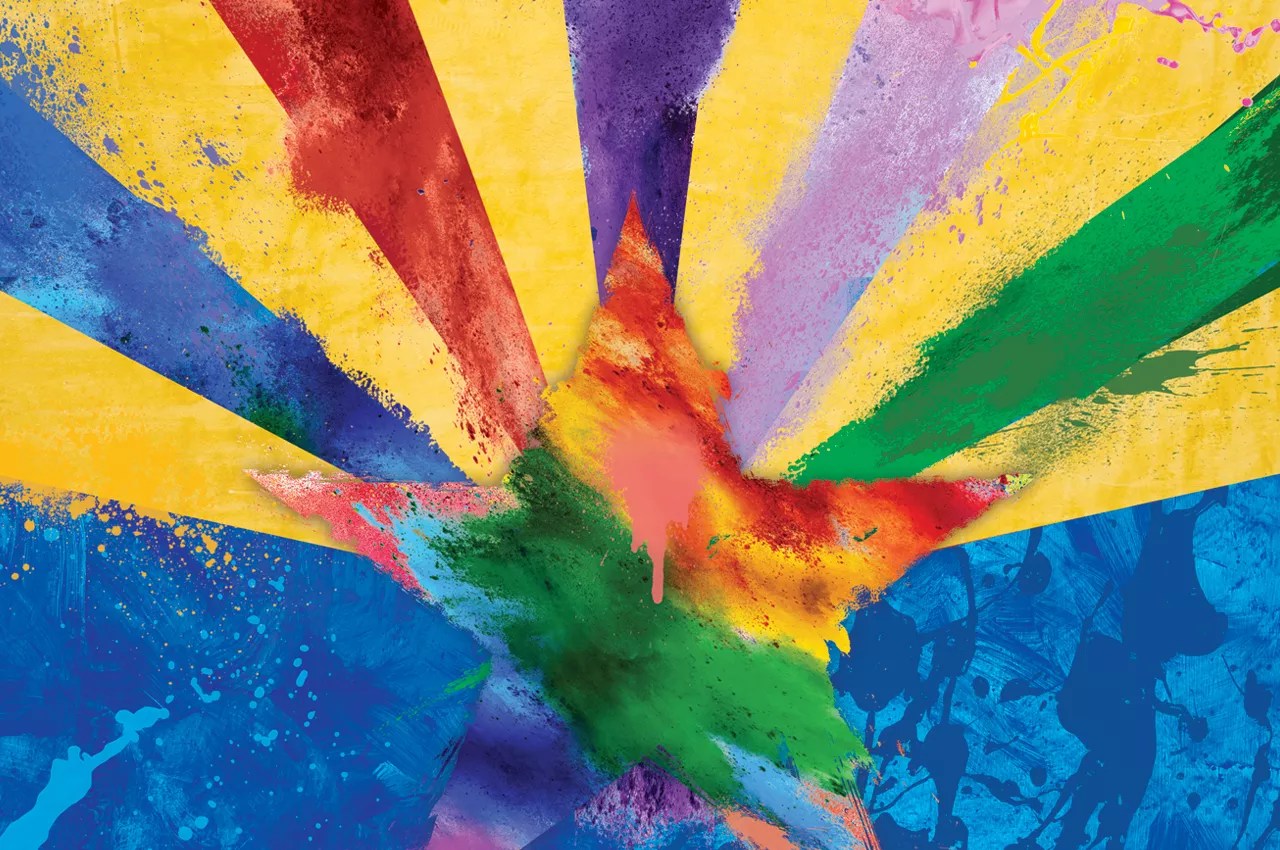
Eric Torres

Audio By Carbonatix
Phoenix Pride weekend, Oct. 19 and 20, will include a two-day festival, a Sunday morning parade, countless pre-parties and after-parties, and spillover into downtown bars, restaurants and other businesses.
This year’s theme is “Born This Way.” But if you don’t identify as LGBTQ+, you’re still invited. Phoenix Pride staff and volunteers work hard to promote inclusivity and accessibility for all.
The parade and festival are about more than celebrating nontraditional genders or sexualities. Anyone who’s ever felt different or misunderstood for any reason (and who hasn’t?) can bask in acceptance and joy.
“Whether you’re a member of the community, whether you’re an ally, whether it’s your 40th year at Phoenix Pride or whether it’s your first time at Phoenix Pride, that strong sense of warmth and welcome and positivity just engulfs you from the moment you enter,” says Jeremy Helfgot, spokesperson for Phoenix Pride. “And I think it stays with you and follows you after you leave.”
Phoenix Pride Executive Director Mike Fornelli says everyone can live their best life at the events.
“No matter what people are saying in the news, no matter what the Supreme Court is doing, no matter what political candidates have in store,” he said, “be yourself unapologetically and know that you can do that in a safe space.”
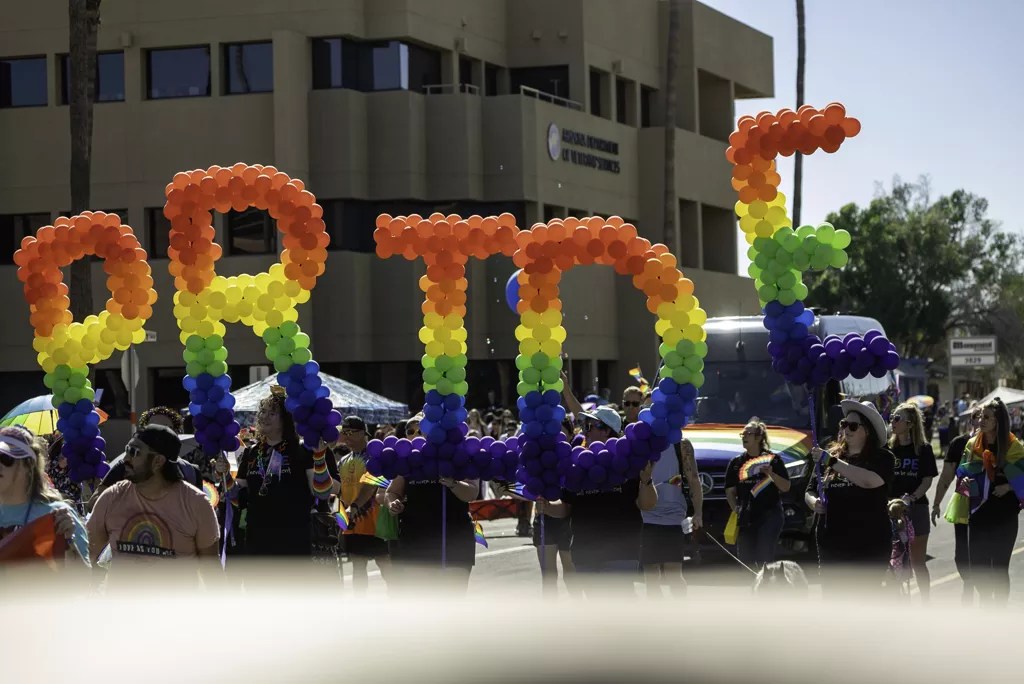
The Phoenix Pride Parade Oct. 20 will attract a wide range of demographics, including families.
Leakedglass Photography/Phoenix Pride
Being LGBTQ+ spans demographics
Even though Pride is for everyone, it’s particularly meaningful for LGBTQ+ people because of the daily discrimination and harassment they face for their gender and sexuality.
But that’s just one part of their identity: The community intersects with every other facet of society. They live in small towns, big cities, and suburbs and run the gamut of demographics.
Helfgot said the events attract “young, old, Black, white, Asian, Jewish, Muslim, Christan – it doesn’t matter. Fully abled or living with challenges. Female, male, nonbinary, fluid. It really, truly is the rainbow.”
LGBTQ+ people have the same issues and challenges as everyone else, he adds. They might have trouble finding healthcare or housing. Maybe they’re undocumented or facing aging issues. They could have mental or physical disabilities.
Mike Fornelli says, “Pride is all about self-empowerment, self-determination, showing the world that there’s pride to be found in just being unapologetically yourself. Being able to let your freak flag fly without any kind of judgment.”
He adds, “It’s people enjoying themselves being who they are, knowing that nobody’s going to make fun of them, nobody’s going to judge them, nobody’s going to tell them, “No, you can’t do that.'”
And Phoenix Pride doesn’t end when the festival is over. To help support LGBTQ+ people and causes all year round, Phoenix Pride has a community foundation with three arms: scholarships, community grants and partnership grants.
Community grants consider five pillars of determination: health and education; community development; social justice and inclusion; LGBTQ+ arts, culture and history; and housing and provisions.
“The LGBTQ+ community is everywhere, so we’re able to help support and fund programs that are everywhere,” Helfgot says.
Fornelli added that roughly 50 percent of the community grants benefit allied organizations that support not only the LGBTQ+ community but all Arizonans. As one example, it gives to the Brighter Way Institute, which provides pediatric dental care for those who can’t afford it.
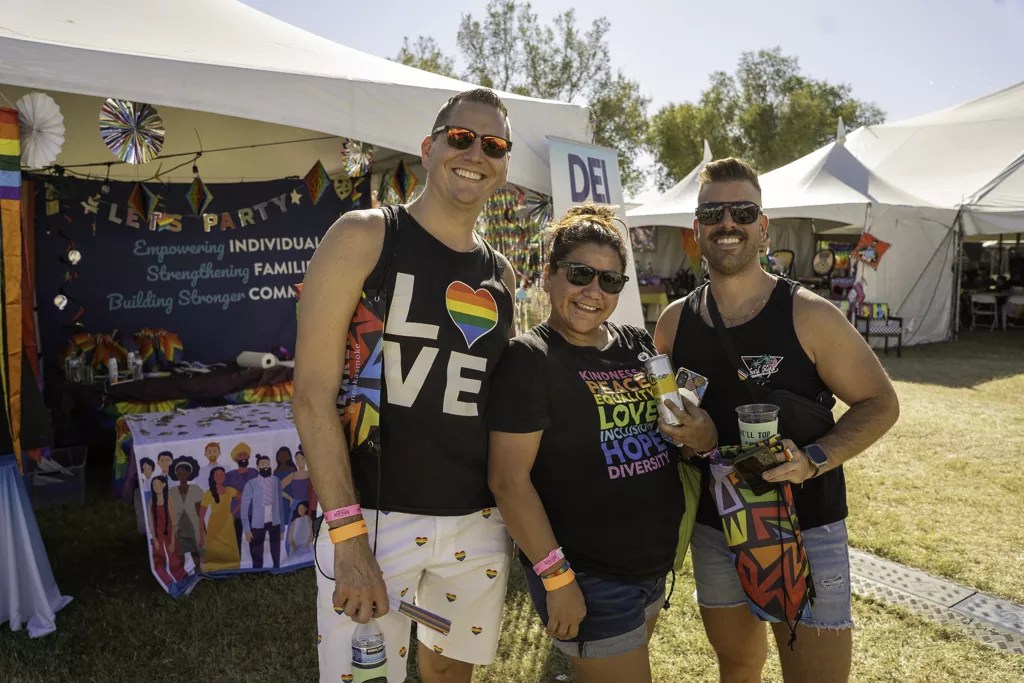
Phoenix Pride is a place for anyone who’s ever felt different or misunderstood to bask in acceptance and joy.
Leakedglass Photography/Phoenix Pride
Allies are integral to Pride
Straight, cisgender allies are important in creating safe and inclusive spaces at Phoenix Pride and beyond, not to mention funding the events.
“Our festival costs almost $2 million to put on,” Fornelli says. “We would not be able to do that as a nonprofit without sponsorship from allies, corporations and businesses that support us.”
That said, Fornelli quickly points out that Phoenix Pride does due diligence to ensure a company isn’t engaging in “rainbow washing.” That means they show up at a Pride parade for opportunistic reasons but don’t advocate for the LGBTQ+ community the other 364 days a year.
“We check quality index scores for anyone who wants to come in as a sponsor to make sure they’re supporting our community year-round and not as a one-off thing to fill a box,” he says.
Allies come in the form of participants, too. Gov. Katie Hobbs is one of the grand marshals this year; she’s a longtime ally, having worked for Phoenix Pride while serving in the state legislature. (The other grand marshals are Chef Silvana Salcido Esparza and performer David Hernandez).
And everyone who attends is an ally. Alero Mills, who’s volunteered with Phoenix Pride since 2002, says the parade has grown from about 5,000 to 50,000 over the years, and she’s seen it attract more families.
“When you bring kids into (Pride), they know how to love unconditionally and without judgment,” she says. “Parents understand unconditional love is the best love. So I’m always happy when I see families.”
Importantly, by including everyone, “Pride helps people become better allies and advocates,” Mills notes.
These allies can, in turn, teach others to be more sensitive and accepting. Mills says when people say something they think is funny about LGBTQ+ people and don’t realize it’s not, it’s helpful for allies to speak up.
“I don’t think people are malicious, but they just don’t know, and it’s still hurtful,” she says.
When asked what Pride means to her personally, Mills says, “It’s a time when those that feel ‘less than’ can actually feel whole.”
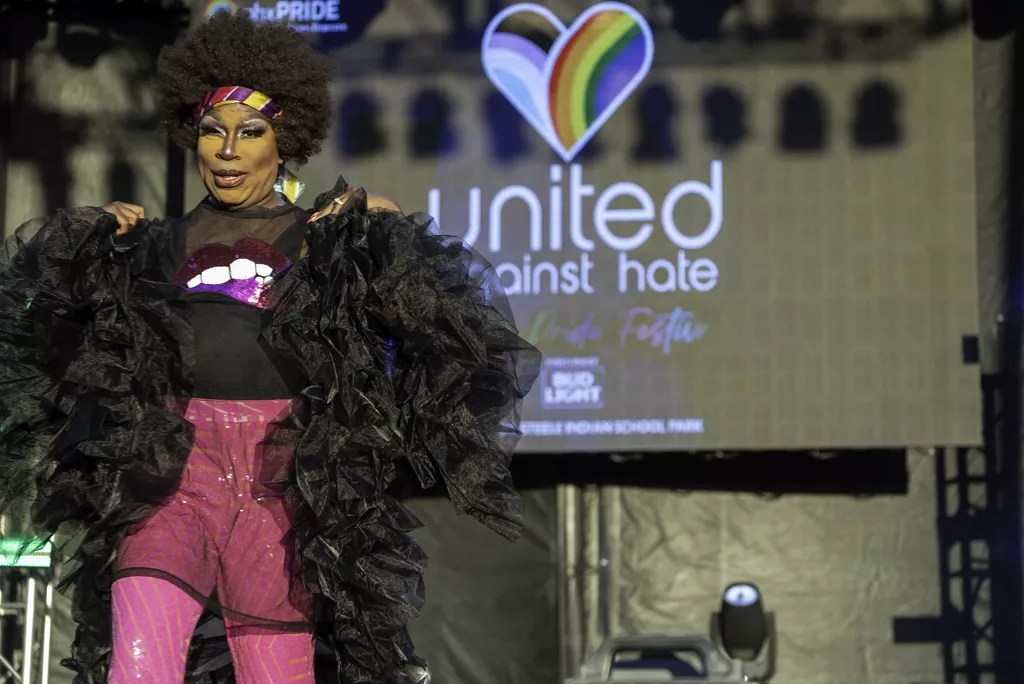
A diversity of demographics attend Phoenix Pride.
Leakedglass Photography/Phoenix Pride
Accessibility fosters inclusivity
Another way Phoenix Pride fosters inclusivity is by purposefully considering and creating accessibility for all. That manifests in several ways.
Stella Kowalczyk, who started with Pride a decade ago as a volunteer interpreter for the Deaf, is now the nonprofit’s director of engagement. She’s helped the organization become a national leader in the Pride movement for its commitment to accessibility.
For example, those who need extra accomodations can enter via a dedicated entrance. Mobility shuttles will help people get around the festival and from the parade to the festival.
Also, a “senior cooling area” will give people over 50 a break from the sun. A neurodiverse quiet zone provides a respite from noise and activity. A specialized accessibility team will be on standby to offer customized assistance based on individual needs.
And American Sign Language interpreters will work the information booth, stages, parade grandstand and more.
“We didn’t used to have interpreters in our Erotic World, and a community member asked why,” Kowalczyk says. The next year, she made sure interpreters worked the 18-and-up area featuring fetish demonstrations, exotic dancers and more.
“That area is fully interpreted both days, all weekend,” she says, adding, “It is a specialized vocabulary.”
The organizers ask in advance for song lyrics, scripts and the like from performers and descriptions of parade entries to improve the accuracy of interpretations.
“Interpreting is difficult enough,” Fornell says, “and when you’re trying to do it on the fly, it can be taxing on the interpreter.”
Also, while pets are not permitted, emotional support animals are allowed on a case-by-case basis.
“If that animal is going to help a community member get out and have a day or two when they can get out and be authentically themselves and around other people that are affirming, and that animal allows them to do that, that is OK,” Kowalczyk says.
She added that because most Pride festivals nationwide are volunteer-run, they don’t have the bandwidth to consider accessibility. Phoenix Pride has four paid employees and hundreds of volunteers, which gives them more resources.
And they strive to improve each year. After every event, the staff, volunteers, board members and community members recap what went right and what went wrong.
“Phoenix Pride wants to make sure the plus (in LGBTQ+) represents everyone,” Kowalczyk says. “It’s not just everyone in the alphabet soup. We want to make sure we’re being inclusive to everyone.”
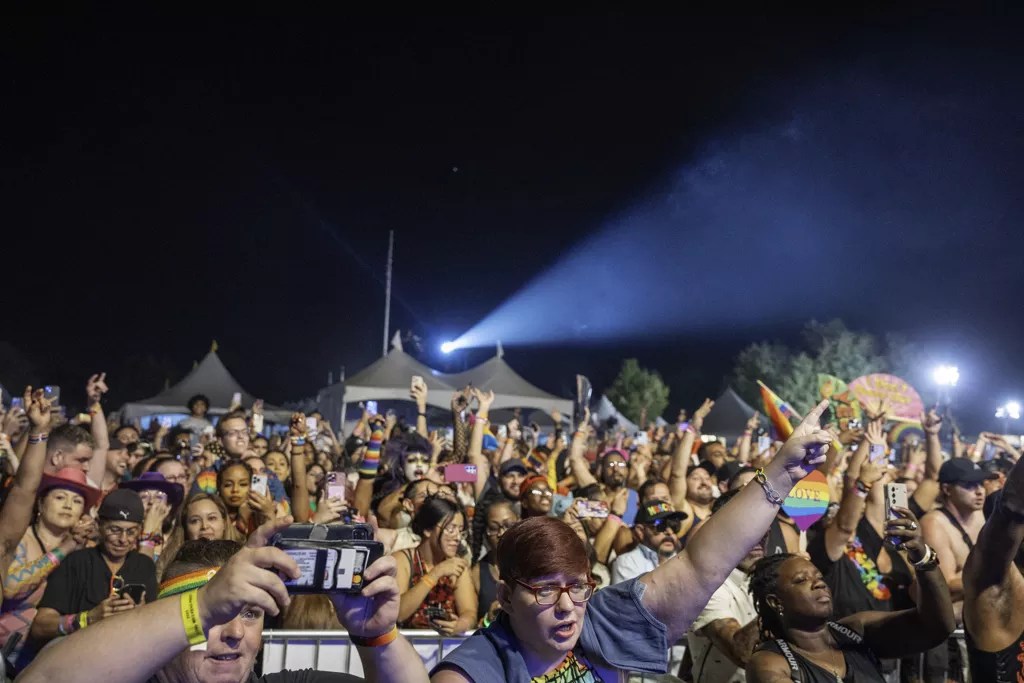
Phoenix Pride always attracts a huge, enthusiastic crowd at the main stage.
Leakedglass Photography/Phoenix Pride
‘Music unites people’
Entertainment is a cornerstone of the Phoenix Pride Festival, with seven stages featuring “everything from dancers to singers to comedians to drag performances,” Fornelli says.
Offering an array of styles helps ensure everyone has fun despite different tastes, he adds. There’s high-energy dance music with mostly local DJs, low-key acoustic or piano music, a Latin stage and a main stage with headliners such as David Archuleta, Saucy Santana, Slayyyter, the Scarlet Opera and VASSY.
This year, Fornelli is excited that 100 percent of the performers identify as LGBTQ+ so people can see that representation. Seeing others who are free to express themselves has a positive impact, he says.
Archuleta, for example, who will headline at 8 p.m. Sunday, Oct. 20., has talked frequently of his fear of coming out as queer and how much happier he is now.
As his official website reveals, he wrote the 2024 song “Hell Together” after he told his mom he was leaving the Mormon faith, and she told him she would, too, saying, “If you’re going to hell, we’re all going to hell with you.”
Archuleta also dedicated the song “to those who show unconditional love in a world where it’s so easy to judge things we don’t fully understand, the way my mom showed that love to me.”
Fornelli, who ran the popular LGBTQ+ nightclub BS West in Scottsdale for 35 years, says, “Music unites people in much the same way advocacy does. It brings people together to fight for a better world.”
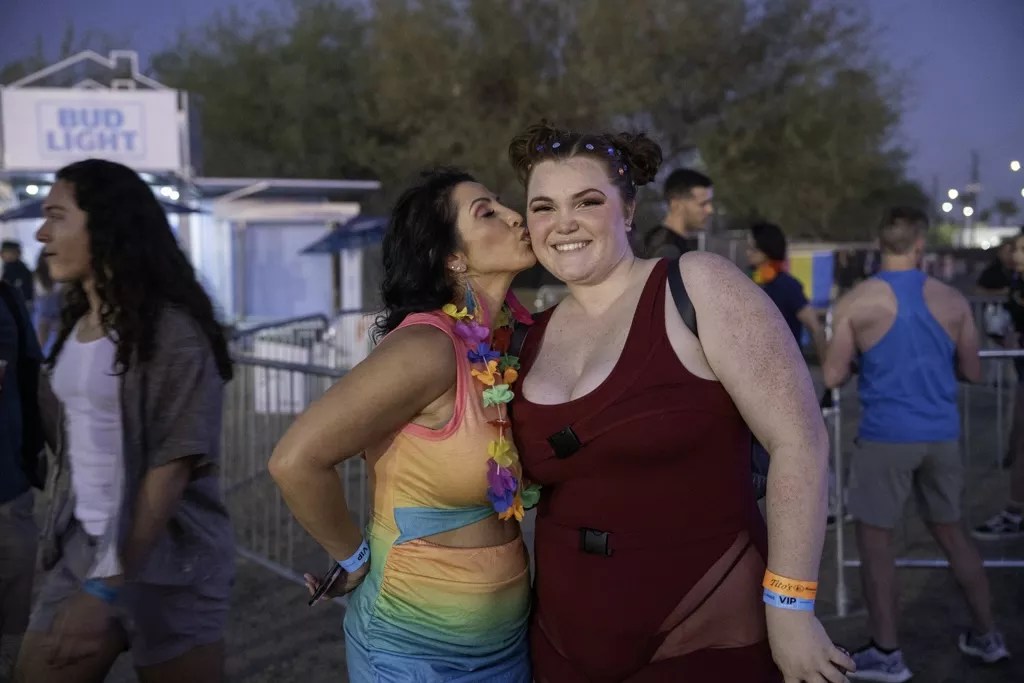
Phoenix Pride is all about people being their authentic selves.
Leakedglass Photography/Phoenix Pride
Pride aims to ‘unite, educate and engage’
When Fornelli moved to the Valley in 1990, he recalls, there weren’t as many gay bars or other safe spaces for the LGBTQ+ community.
Now, he says, advances have been made in terms of acceptance throughout society. But there have also been many steps backward – particularly politically and in the court of public opinion. From legislation in some states banning gender-reaffirming care to people getting upset at putting their pronouns in email signatures, people try to negate the existence of LGBTQ+ people in myriad ways.
Instead of excluding someone due to differences, Fornelli encourages people to come together. “The mission of Phoenix Pride is to unite, educate and engage the LGBTQ+ community and our allies,” he says.
Pride is also important because it allows everyone to be authentic, Fornelli notes.
“If you’re always worried about what people are going to think, so you don’t dress the way you want to say or don’t say what you think, or don’t love the way you want to love,” he explains, “you can’t be comfortable with who you are if you’re trying to hide that.”
No matter who you are, Pride is for you, Helfgot notes.
“There is an energy and very strong sense of belonging that I think it’s almost impossible not to tap into when you’re there,” he says.
Phoenix Pride. 2 to 10 p.m. Saturday, Oct. 19, and noon to 9 p.m. Sunday, Oct. 20. Steele Indian School Park, 300 E. Indian School Road. Tickets are available online. The parade, which starts at 10 a.m. on Sunday, Oct. 20, at Third Street and Thomas Road, is free. Get more info at phoenixpride.org.